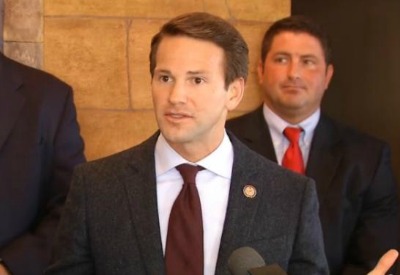A trial date for former U.S. Representative out of Peoria could soon be announced following yesterday’s refusal by an appeals court in Chicago to dismiss charges of alleged corruption.
Former Congressman Aaron Schock could soon be on trial for various allegations of wire fraud and falsification of election commission filings after a three-judge panel of the 7th U.S. Circuit Court of Appeals in Chicago determined that appellate courts cannot legally assess whether Schock’s prosecution violated constitutional separation-of-powers clauses until a trial actually takes place and a verdict is rendered.
A 36-year old former Republican Congressman, Schock resigned from his office in 2015 and indicted in 2016 on corruption charges that included allegations that he used campaign funds to furnish his office to resemble that of the décor seen in the television series “Downton Abbey.” Charges against Schock also include claims that the former Congressman illegally sought to be reimbursed for a $5,000 chandelier.
Last year, U.S. District Judge Colin Bruce of Urbana threw out two of the original 24 counts against Schock, and allowed his trial on the remaining counts to be delayed until the decision of the 7th Circuit appeals court. With that process having ended yesterday, Bruce could potentially set a date for Schock’s trial on the 22 remaining counts sooner rather than later.
Throughout the pre-trial appeals process, Schock’s lawyer, George Terwilliger’s main contention centered on the claim that the prosecution based charges on ambiguous rules that the House set for itself. During that time, several courts have sided with Schock’s defense team, saying that the Constitution prohibits executive-branch prosecutors from charging legislators on the basis of unclear congressional rules. Following yesterday’s decision by the 7th U.S. Circuit Court of Appeals, Terwilliger said in a statement, “As we continue to contend in court, the charges are the result of a determination to indict in spite of the true facts, not because of them.”
Countering that argument, prosecutors contend that they in fact were not relying heavily on House rules, and they would only refer to certain House rules at trial as an attempt to prove criminal intent. The prosecution also argues that several charges against Schock, including ones that the former Congressman falsified tax returns, simply have nothing to do with House rules.
The former Peoria-based Congressman has entered not guilty pleas on all 22 remaining counts, including accusations of wire fraud and falsifying election commission filings. Schock could be facing a maximum of 20-year prison term were he to be convicted of even one count of wire fraud.




